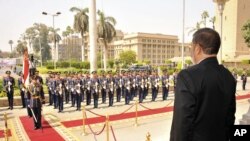An Islamic scholar has warned Egyptians will soon witness a series of confrontations between President Mohammed Morsi and the Military Council after the new leader ordered the dissolved Islamist-led parliament to reconvene.
Tawfik Hamid, senior fellow and chair for the Study of Islamic Radicalism at the Potomac Institute for Policy Studies, said Morsi’s decree will sharply increase tension in Egypt.
Morsi’s order sharply contravenes the military's dismissal of the assembly based on last month’s Supreme Court ruling.
“It’s the beginning of a serious confrontation and the situation is very volatile now because the military will not allow this to happen,” said Hamid. “It’s a serious issue because the decision of dissolving the parliament was not the decision of the military.”
Morsi issued a decree Sunday ordering lawmakers to start meeting again. He also ordered that new parliamentary elections will be held within 60 days of the adoption of Egypt's new constitution.
Many of the new lawmakers were from the once-banned Muslim Brotherhood, the political movement that the new Egyptian leader quit after taking office.
The country’s Supreme Constitutional Court ordered the parliament dissolved after finding fault with the election process. The then-ruling military generals implemented the decision and gave themselves legislative powers in the absence of parliament.
Hamid said observers did not anticipate the confrontation between the president and the military council to begin so soon following Morsi’s recent victory in the presidential run-off vote.
“This was expected, but not to happen within just a few days of his presidency. So, it just happened prematurely for many who were expecting the confrontation coming between the military and the Muslim Brotherhood and Morsi. But, really, the decision was relatively fast,” said Hamid.
Hamid said there has been mixed reaction from top officials of the Military Council.
“A general in the [army] said the decision of Morsi is completely against the constitution and it will give the military the right and the military has the right to intervene to protect the Egyptian constitution and law,” said Hamid.
“Another general said we will not probably respond as the Supreme Council of the Armed Forces, but we will wait for the decision of the Supreme Constitutional Court,” he added.
The court is reportedly holding an emergency meeting following Morsi’s decree.
“This is a very serious issue because this is the first time in the history of the country that a president has turned down the decision of the Supreme Constitutional Court," said Hamid. "Even [Hosni] Mubarak himself on two occasions bowed to the decision of this court, when they decided to dissolve the Egyptian parliament a few years ago when Mubarak was president.”
Tawfik Hamid, senior fellow and chair for the Study of Islamic Radicalism at the Potomac Institute for Policy Studies, said Morsi’s decree will sharply increase tension in Egypt.
Morsi’s order sharply contravenes the military's dismissal of the assembly based on last month’s Supreme Court ruling.
“It’s the beginning of a serious confrontation and the situation is very volatile now because the military will not allow this to happen,” said Hamid. “It’s a serious issue because the decision of dissolving the parliament was not the decision of the military.”
Morsi issued a decree Sunday ordering lawmakers to start meeting again. He also ordered that new parliamentary elections will be held within 60 days of the adoption of Egypt's new constitution.
Many of the new lawmakers were from the once-banned Muslim Brotherhood, the political movement that the new Egyptian leader quit after taking office.
The country’s Supreme Constitutional Court ordered the parliament dissolved after finding fault with the election process. The then-ruling military generals implemented the decision and gave themselves legislative powers in the absence of parliament.
Hamid said observers did not anticipate the confrontation between the president and the military council to begin so soon following Morsi’s recent victory in the presidential run-off vote.
“This was expected, but not to happen within just a few days of his presidency. So, it just happened prematurely for many who were expecting the confrontation coming between the military and the Muslim Brotherhood and Morsi. But, really, the decision was relatively fast,” said Hamid.
Hamid said there has been mixed reaction from top officials of the Military Council.
“A general in the [army] said the decision of Morsi is completely against the constitution and it will give the military the right and the military has the right to intervene to protect the Egyptian constitution and law,” said Hamid.
“Another general said we will not probably respond as the Supreme Council of the Armed Forces, but we will wait for the decision of the Supreme Constitutional Court,” he added.
The court is reportedly holding an emergency meeting following Morsi’s decree.
“This is a very serious issue because this is the first time in the history of the country that a president has turned down the decision of the Supreme Constitutional Court," said Hamid. "Even [Hosni] Mubarak himself on two occasions bowed to the decision of this court, when they decided to dissolve the Egyptian parliament a few years ago when Mubarak was president.”





